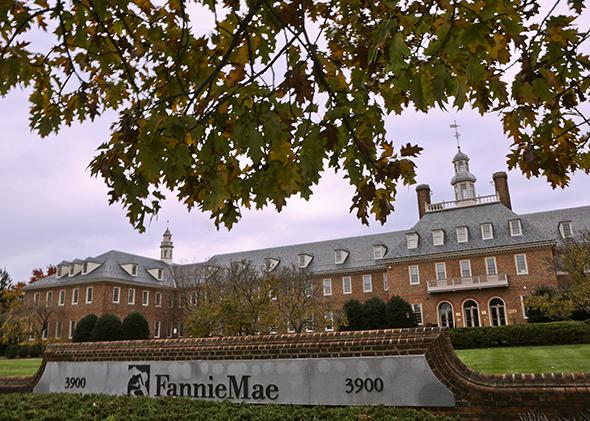Washington, D.C., is awash in plans for what to do with Fannie Mae and Freddie Mac. The companies have been in limbo for years now, ever since sky-high rates of defaulting mortgages forced them to go bust back in 2008. After the firms were privatized, they operated with the understanding that their debt was implicitly guaranteed by the federal government; that implicit guarantee became explicit when Congress gave the Bush administration formal legal authority to follow through. The firms went into “conservatorship”—i.e., a federal takeover—and needed nearly $200 billion to pay what they owed. Now that the housing market has revived and the companies are profitable, the bipartisan consensus is that something should be done with them.
Somewhat remarkably, essentially none of the plans floating around takes the simplest approach to executing Fannie and Freddie’s historic mission of subsidizing middle-class home purchases, which is to have the government subsidize middle-class home purchases.
The various plans instead tend to involve complex public-private hybrids. In each case the proponents promise a utopian bounty in which the government somehow evades bailout risk without creating any countervailing costs for homebuyers. The idea is that private companies are going to want to step in, buy 30-year fixed-rate mortgages, pool them into securities, and thus create a deep and liquid market for conventional mortgage lending, all without exorbitant subsidies. But does anyone really want to do this? Into the breach has stepped Fairholme, a private equity firm that’s touring New York City and D.C. with an appealing proposal: a public-private hybrid model that actually has a willing and eager private participant.
Fairholme’s presentation frames the issue perfectly, starting with the title “Answering the Call for Private Capital” and opening with quotations showing the broad cross-partisan consensus about the need for private capital—not the government—to play the lead role in the mortgage market.
What follows are the details of how the private securitization company that Fairholme wants to run would work, how Fannie and Freddie’s existing class of securities could be profitably wound down over time, and how keeping the basic technology of mortgage securitization in government hands would avoid the need for future bailouts. As far as needlessly complicated public-private partnerships to organized unnecessary home purchasing subsidies are concerned, this is a reasonable one.
But about that “private” capital. An awful lot of it turns out to come straight from Uncle Sam.
You see, of the $52 billion in private money that Fairholme says is needed to execute their plan, Fairholme plans to raise about $17.3 billion in a new offering. An additional $34.6 billion would come “from conversion of existing preferred stock,” which in context means “as a gift from the federal government.” That’s because Fairholme’s existing shares aren’t worth anything close to $34.6 billion. At current market prices, they’re maybe 40 percent of that. But really they’re worth nothing at all. The market price essentially reflects speculation on the possibility that owners of the preferred shares will reap a government windfall that they don’t deserve.
This all goes back to what happened when the government took over Fannie and Freddie in the first place. The people to whom Fannie and Freddie owed money got a “bailout”—the government covered the housing giants’ debts. But this didn’t take the form of the federal government handing money over to the shareholders and managers. Instead, the shareholders were essentially wiped out. Management of the companies is in the hands of the Federal Housing Finance Agency, and most of the profits the companies make are rebated to the government as special dividends. As shares confer no control over Fannie and Freddie nor any entitlement to any profit streams, they’re basically worthless. In recognition of that worthlessness, their stocks were delisted from the New York Stock Exchange.
But the shares have nonetheless continued trading over the counter as penny stocks. And as Fannie and Freddie’s profits have mounted, the people and institutions that bought the shares have argued that they deserve a share of the profits.
Except they don’t. Vulture investors in the stock were engaged in pure speculation. Their willingness to risk money on owning slices of the former companies did absolutely nothing beneficial to the government or to society at large. It was in a small way a favor to the shareholders from whom they bought the stock; otherwise, they would have gotten nothing at all. But from a social perspective, that was bad, not good. Wiping out the shareholders and preserving 100 percent of the upside for the taxpayer gave this particular bailout less of a whiff of moral hazard than we saw with the Troubled Asset Relief Program and other programs. It should be a model for any future financial interventions. Rewarding speculators with a windfall only makes everything worse. If private capital is to rescue the mortgage market, then it should be genuinely private—not public money passed to private citizens for private gain.
